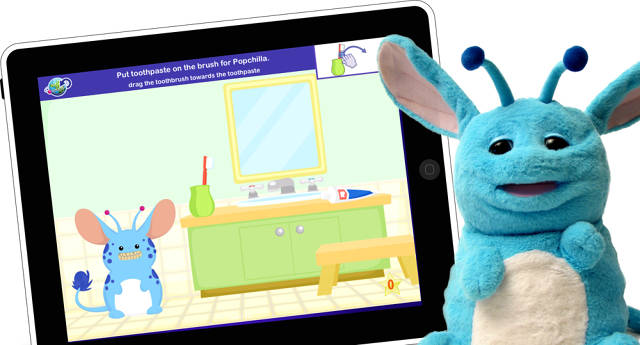Popchilla might look like an adorable plaything, but it's way more than that. It's a special tool that can be controlled by parents or therapists to help interact with autistic children.
Toy robots can bring out the kid in anyone, but children with autism are especially mesmerized by them. Now a startup called Interbots in Pittsburgh, Pennsylvania has developed a 10-inch tall robot named Popchilla that is designed specifically for kids with autism spectrum disorder. "Some autistic children are more willing to interact with robotic devices than humans. We want to use Popchilla to help those children with their social skills and interacting with real people," says Interbots Chief Technical Officer Michael Knight.

The furry blue bot, which is still a prototype, has bunny ears and a tail like a lion's. But Popchilla's human-like facial expressions really set it apart from other toys. When he's happy, Popchilla's ears shoot straight up while his eyes open wide and glow green. When angry, his eyes narrow and flash red while his ears descend. The LED-lit eyes can also turn pink to show embarrassment, yellow for confusion, and orange to register surprise.
Unlike most robotic toys, which are completely autonomous, Popchilla's movements are controlled either by a parent or therapist using a remote control or software program. This electronic puppeteering helps keeps Popchilla's costs down (since no sensors or expensive microprocessors are built into the toy itself) and allows adults to customize the toy's actions to meet kids' individual needs. "Children with autism don't react well to things that are unpredictable, and therapists prefer to use tools and technology that they have full control over," says Interbots CEO Seema Patel.

Popchilla isn't the only robot for autistic kids—researchers at the University of Hertfordshire in the United Kingdom recently showed off their humanoid Kaspar model—but it will likely be one of the most affordable options. The company hopes to market the toy for around $500, but has not yet set a release date. In the meantime, it is developing an iPad game called Popchilla's World that helps autistic kids overcome the fear of daily routines—like brushing their teeth and getting dressed in the morning—by rewarding them with virtual prizes like balloons falling down from the sky. The company will demo Popchilla's World at the Consumer Electronics Show in January and plans to release a free version of the game later in the year.